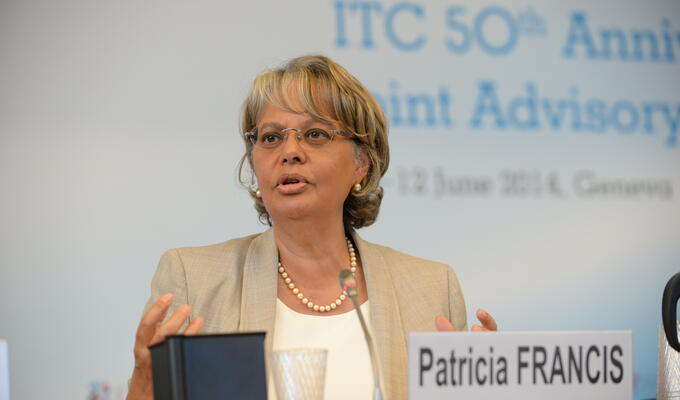

10 Questions with... Patricia R. Francis
Trade Forum caught up with former ITC Executive Director, Patricia R. Francis, to reflect on her time at ITC, as well as gain her perspective on the current trade landscape. Ms. Francis was the head of the organization from 2006-2013.
1. What did you want to be when you were growing up?
My family assumed I would get married and work in the family business. However, at a time when expectations of women were limited, I gravitated toward activities aimed at societal change.
2. What surprised you the most about your career path and why?
Starting off in the private sector, I realized that businesses and society needed good public policy to grow. Against the advice of friends and family, I decided to join the government but with the mandate to expand trade and investment.
The need to influence global policy development led me to become the President of the World Association of Investment Promotion Agencies, then the Executive Director of ITC, and finally working with the UN and UN Women on the economic empowerment of women.
3. What is the best piece of advice you ever received? What is the worst?
Best Advice: Be prepared, do your homework, and listen to all sides of the story. Understand what result you are trying to achieve and how stakeholders will be impacted. Finally, build trust to connect you to your purpose, commit to this, and show leadership which powers you to deliver on it.
Worst Advice: If you want to succeed when joining a new organization, keep your head down, make a few changes and your bosses will leave you to carry on as usual.
4. What was your first day at ITC like as the then-Executive Director?
I was very excited by the size of the task ahead but totally confused by all the acronyms and internal processes that people used; there were so many manuals and administrative elements. On top of that I received a huge evaluation report on the organization’s health. But what impressed me most that first day was the staff’s sheer diversity and depth of knowledge.
5. What are you most proud of from your time leading ITC?
The first was modernizing administrative procedures, accounting, HR, results-based management, IT, programmes, strategic planning and management reports. The second was changing the contracts of critical consultant positions to staff, for instance those working on trade data, which allowed us to provide trade data free to all developing countries. Third, mainstreaming the Millennium Development Goals (before the SDGs were introduced) and women in trade into ITC’s work, while transforming our image and branding to reflect our origin.
6. What are three things you appreciate most about ITC’s current work?
Trade data as an analytical tool for member states; expanding on women in trade; capacitating and bringing supply chains to international standards and markets while considering the environmental impact and climate change adaptation.
7. How do you see ITC’s future role in shaping the trade-led development agenda?
ITC should focus on understanding how markets can work for development and inclusion, while being climate smart and AI ready. If this is a core objective, then which policies do we need to drive this, which support organizations do the private sector and governments need to deliver, and finally what do companies need to do to adapt and prosper in this environment? If ITC can find its niche in helping countries develop ecosystems around these challenges, it will shape trade-led development.
8. What excites you the most about (working in) trade today?
We are in a time of global political and technological change and, as this transformation takes place, we need to be ready to seize the opportunities. With my work in private equity, government, and the Atlantic Council, among others, I can advise and make connections that provide real solutions to those interested in moving forward.
9. What would be a few “big wins” for trade and sustainable development in the coming years?
The implementation of WTO’s Trade Facilitation Agreement would make a huge impact on the competitiveness of developing countries, particularly for small island developing States and landlocked developing countries, as would a financial ecosystem that allows for financial inclusion and long-term financing of trade infrastructure. However, all this needs to happen within a climate-smart environment.
10. If you had one piece of advice to give future trade leaders, what would it be?
Be ready to adapt to a rapidly changing world. Artificial intelligence, quantum learning, and climate change will impact our future. Current policies will need to change if we are to take full advantage of opportunities for our people, countries, and planet.






.JPG?itok=ekHv1K9C)